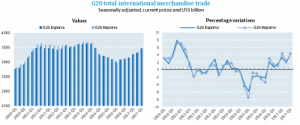Finance & Economics
Ending Child Marriage Could Generate $3 Billion in Annual Benefits for Uganda’s Population by 2030
Ending child marriage today could generate $3 billion per year for Uganda by 2030, says a new report published by the World Bank, on December 5. In contrast, the perpetuation of child marriage would lead to lower educational attainment for girls and their children, higher population growth, substantial health risks, higher intimate partner violence, and lower earnings for women, as well as higher poverty.
- Read more
- 319 reads
PNG taking steps to reinforce economic resilience
A rebounding agricultural sector and improving efficiency in liquefied natural gas (LNG) production are recent highlights of the PNG economy, according to new report released by the World Bank on December 5. Nonetheless, growth slowed in 2017 owing to necessary public spending adjustments, coupled with foreign currency shortages.
- Read more
- 320 reads
Wild fisheries landings decline while aquaculture surges
Landings of wild-caught fish in OECD countries are 40% below their late 1980s peak and continue to decline, while aquaculture production has been increasing at an annual rate of 2.1% since 2011, according to a new OECD report.
- Read more
- 297 reads
IMF Executive Board Completes First Review Under the ECF and Approves US$22.58 Million Disbursement for Benin
On December 1st, the Executive Board of the International Monetary Fund (IMF) completed the first review of the arrangement under the Extended Credit Facility (ECF) for Benin. Completion of the review enables the disbursement of SDR15.917 million (about US22.58 million), bringing total disbursements under the arrangement to SDR31.834 million (about US$45.16 million).
- Read more
- 303 reads
New Policy Approach Needed for East Asia and Pacific to Achieve Inclusive Growth: World Bank
The countries of developing East Asia and Pacific – among the most successful in the world in reducing poverty and improving living standards – need to adopt a new thinking if they are to achieve inclusive growth going forward, says a new World Bank report.
- Read more
- 361 reads
Civil society call for an inclusive and coherent long term sustainable post-2020 strategy for Europe
The conference, which took place on 27-28 November 2017 in Budapest, was organised by the European Economic and Social Committee (EESC), with the support of the Hungarian Economic Association and the Hungarian Ministry for Human Resources.
- Read more
- 359 reads
Indonesia’s middle class vital for the country’s future
Expanding Indonesia’s middle class can help boost economic growth and broaden prosperity. This is a key message emerging from two new World Bank reports on the middle class in East Asia and Indonesia that were discussed in Jakarta, on December 4th.
- Read more
- 338 reads
The Vulnerable in Latin America and the Caribbean are Often Just One Disaster Away from Falling Back into Poverty
Countries across Latin America and the Caribbean (LAC) have made major progress in reducing poverty and inequality, but frequent natural and man-made shocks threaten to drive many people back into poverty unless efforts to mitigate and manage risks are stepped up, according to a new World Bank report.
- Read more
- 334 reads
International trade statistics: trends in third quarter 2017

- Read more
- 287 reads
Russian Economy Returns to Modest Growth in 2017, says World Bank
The Russian economy has returned to modest growth – amidst positive global growth, a recovery in trade, rising oil prices, and growing macroeconomic stability – according to the World Bank’s latest Russia Economic Report (no. 38 in the series), launched in Moscow, on November 29.
- Read more
- 305 reads
Human Rights
Fostering a More Humane World: The 28th Eurasian Economic Summi

Conscience, Hope, and Action: Keys to Global Peace and Sustainability

Ringing FOWPAL’s Peace Bell for the World:Nobel Peace Prize Laureates’ Visions and Actions

Protecting the World’s Cultural Diversity for a Sustainable Future

Puppet Show I International Friendship Day 2020

